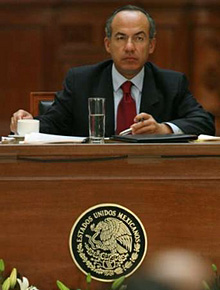 |
 |
 |
 News Around the Republic of Mexico | January 2007 News Around the Republic of Mexico | January 2007  
Calderón Ready to Press for Reforms
 Adam Thomson - Financial Times Adam Thomson - Financial Times


| | President Felipe Calderon attends a meeting of Mexico's security council at presidential palace in Mexico City January 22, 2007. (Reuters/Daniel Aguilar) |
Felipe Calderón is in a quietly confident mood. He sits in his office in Los Pinos and plays with the gold wedding ring on his right hand - he confesses to being so left-handed he finds it difficult to put the ring on the correct side - while he talks of his achievements after his first 50 days.

Much of them have to do with a large-scale assault on drugs and drug-related crime, which are a growing problem in his country of 105 million people. He accepts that the thousands of troops he has deployed as part of the offensive have a long way to go before they start to make a real impact.

But he insists that there have already been some successes, such as the reduction in Michoacán, his native state, of murders by almost 40 percent.

"We have passed from the defensive to the offensive," he tells the Financial Times in an interview. "We are no longer just waiting to take the punches from organized crime."

Now, the former energy secretary is busy preparing another assault: on monopolies.

Look at the corporate landscape and the overriding feature is a handful of companies in key sectors setting prices more or less as they wish and stifling competition. Mexico is not competitive enough, says Calderón bluntly.

One of many obvious examples is telecommunications, where Telmex, the company owned by Carlos Slim, the world´s third richest man, rules supreme.

On this issue, Calderón abandons the nuanced phrases so typical of heads of state and begins to talk with all the directness of a chat among friends.

He admits, for example, that the cost of a telephone call is too high and insists on the need to bring them down through fierce competition. "The way to do that is to create a much more competitive market structure, to eliminate barriers to entry so that anyone willing to offer cheaper telephone services can do it without restrictions," he insists.

And that is not the only change that big companies are going to have to get used to, says Calderón. Another is paying taxes.

Calderón says that one of the first big reforms his administration intends to pass through Congress is on tax structure. Tax take is the second- lowest in Latin America after Haiti.

Calderón stops short of giving specific timing or details of what the reform will contain. "I prefer to work to the rhythm of Congress," he says.

But he does say it will mean big companies paying more taxes.

"It has to be a reform clearly aimed at increasing government income ... and close as much as possible the tax exemptions that have formed over decades, in many cases resulting from political interests and the capacity of powerful economic groups to exert pressure," he says.

On Pemex, the state-run oil monopoly, Calderón is also clear on the need for big changes.

"We are experiencing a real fall in oil reserves ... and that forces us to innovate and seek mechanisms which, without giving up hegemony or sovereignty of our reserves, provide Pemex with investment schemes that give it much greater margin to invest more, to explore more."

He suggests that Mexico must look at state-run companies such as Petrobras in Brazil, or even that of China, which have exploited alternative sources of financing through, for example, selling shares in the stock market.

Yet he admits reforming Pemex will not be easy and will "probably" require changes in the Constitution. So, he will need to win over Congress.

Calderón describes the political atmosphere as "challenging" but also notes the "constructive" attitude of the various political parties. Indeed, with one more twist of the gold band on his finger, he suggests that that bodes well for his reform agenda.

"The conditions exist to believe that we can form the [necessary] alliances," he says. | 
 | |
 |



